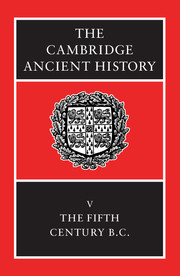Book contents
- Frontmatter
- Contents
- List of maps
- List of text-figures
- Preface
- 1 Sources, chronology, method
- 2 Greece after the Persian Wars
- 3 The Delian League to 449 b. c.
- 4 The Athenian revolution
- 5 Mainland Greece, 479–451 b. c.
- 6 The Thirty Years' Peace
- 7 Sicily, 478-431 b.c.
- 8 Greek culture, religion and society in the fifth century b.c.
- 8a Art: Archaic to Classical
- 8b Classical Cities and Sanctuaries
- 8c Rebuilding in Athens and Attica
- 8d Panhellenic Cults and Panhellenic Poets
- 8e Athenian Cults and Festivals
- 8f Athenian Religion and Literature
- 8g Society and Economy
- 8h Athens as a Cultural Centre
- 9 The Archidamian War
- 10 The Peace of Nicias and the Sicilian Expedition
- 11 The Spartan Resurgence
- Chronological Notes
- Chronological Table
- BIBLIOGRAPHY
- Index
- 1 Greece and Western Asia Minor
- References
8d - Panhellenic Cults and Panhellenic Poets
from 8 - Greek culture, religion and society in the fifth century b.c.
Published online by Cambridge University Press: 28 March 2008
- Frontmatter
- Contents
- List of maps
- List of text-figures
- Preface
- 1 Sources, chronology, method
- 2 Greece after the Persian Wars
- 3 The Delian League to 449 b. c.
- 4 The Athenian revolution
- 5 Mainland Greece, 479–451 b. c.
- 6 The Thirty Years' Peace
- 7 Sicily, 478-431 b.c.
- 8 Greek culture, religion and society in the fifth century b.c.
- 8a Art: Archaic to Classical
- 8b Classical Cities and Sanctuaries
- 8c Rebuilding in Athens and Attica
- 8d Panhellenic Cults and Panhellenic Poets
- 8e Athenian Cults and Festivals
- 8f Athenian Religion and Literature
- 8g Society and Economy
- 8h Athens as a Cultural Centre
- 9 The Archidamian War
- 10 The Peace of Nicias and the Sicilian Expedition
- 11 The Spartan Resurgence
- Chronological Notes
- Chronological Table
- BIBLIOGRAPHY
- Index
- 1 Greece and Western Asia Minor
- References
Summary
THE PANHELLENIC FESTIVALS IN THE FIFTH CENTURY b.c.
Many of the innumerable ancient Greek festivals included athletic and cultural contests. By the fifth century b.c. a few of these gatherings had achieved much more than a purely local prestige and significance. Pindar and Bacchylides often give long catalogues of the victories of an athlete or his family at places all over Greece, but Pindar distinguishes these from the ‘common festivals’, where athletes ‘contested against all the Greeks together’ (Isthm. IV.30–1). By this time, a special group of four festivals had come to be distinguished from the rest, the Olympian, Pythian, Isthmian and Nemean Games, and it is for victories at these that the majority of our surviving epinician poems were composed. These were known as ‘crown games’ (stephanitai), because the prizes were not objects of material value but simply crowns, at Olympia of wild olive, at Delphi of bay, and at Nemea and Isthmia of fresh and dry celery respectively (at least, in Pindar's time). Such crowns were given at some other festivals, but at the majority prizes of greater utility were offered.
These four festivals were in origin very different in size and significance from each other. The Olympic Games, which were held in honour of Zeus, in the district of Pisa beside the river Alpheus, seem to have acquired a wider importance quite early in the Archaic period. Since lists of Olympic victors were kept from the first Olympiad in 776 b.c. onward, they could later be used to provide a convenient chronological framework for the entire Greek world.
Keywords
- Type
- Chapter
- Information
- The Cambridge Ancient History , pp. 223 - 244Publisher: Cambridge University PressPrint publication year: 1992
References
- 2
- Cited by

